|
|
|
Sort Order |
|
|
|
Items / Page
|
|
|
|
|
|
|
| Srl | Item |
| 1 |
ID:
112948
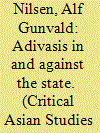

|
|
|
|
|
| Publication |
2012.
|
| Summary/Abstract |
The question of the state has come to occupy a central place in recent debates on subaltern politics in contemporary India. Against those critical voices that have claimed that the emancipation of subaltern groups can only proceed by challenging and moving beyond the modern Indian state, a range of scholars and commentators have asserted that it is precisely by seeking to harness the state that social movements can hope to advance their oppositional projects. Intervening in this debate, this article argues that although these new perspectives constitute a decisive advance in terms of developing a relational understanding of subaltern politics in India, questions pertaining to the structural constraints that social movements face in advancing their oppositional projects through the institutions and discourses of the state are still neglected. The article addresses these questions through a detailed exploration of the ways in and extent to which Adivasi movements have managed to democratize local state-society relationships in western Madhya Pradesh, and discusses the conceptual and political lessons that can be drawn from these experiences. Drawing on recent advances in Marxian state theory, the article argues that it is necessary to move beyond the theoretical impasses of both anti-statism and state-centrism and toward a politically enabling engagement with contemporary Adivasi mobilization in India.
|
|
|
|
|
|
|
|
|
|
|
|
|
|
|
|
| 2 |
ID:
103768
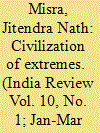

|
|
|
|
|
| Publication |
2011.
|
| Summary/Abstract |
This essay makes a comparative assessment of two works dealing with contemporary India. Gupta explains why India has not taken off despite its impressive growth. Nilekani examines the ideas that have shaped the debate about India's development. The essay argues that Nilekani is more optimistic about India's future than Gupta. Gupta's book is a major work that will stand the test of time. Nilekani's book is novel in that he is an entrepreneur who became an author. These are contrasting works. Gupta asserts that growth in India has not led to development. Nilekani argues that India's growth has become more broad-based. Gupta says that the statistics behind India's success hide its underlying failures. Nilekani considers growth to have become more broad-based. Nilekani's moral vision is concerned with ideas, Gupta's is with people. The essay concludes that Indians may be too optimistic about their achievements, but India also has successes to show.
|
|
|
|
|
|
|
|
|
|
|
|
|
|
|
|
| 3 |
ID:
147468
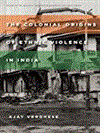

|
|
|
|
|
| Publication |
California, Stanford University Press, 2016.
|
| Description |
xviii, 273p.Pbk
|
| Standard Number |
9780804798136
|
|
|
|
|
|
|
|
|
|
|
|
Copies: C:1/I:0,R:0,Q:0
Circulation
| Accession# | Call# | Current Location | Status | Policy | Location |
| 058786 | 305.800954/VER 058786 | Main | On Shelf | General | |
|
|
|
|
| 4 |
ID:
139676
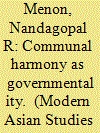

|
|
|
|
|
| Summary/Abstract |
Debates about secularism in post-independence India have often revolved around the visions of two of the country’s founding fathers—M.K.Gandhi and Jawaharlal Nehru. A sharp distinction is drawn between them by those who argue that the Gandhian model (or, what in common parlance and state discourses is called communal harmony) stems from Indian cultural and religious values, and lies beyond the realm of the state. The Nehruvian model, however, is a state project through and through. This article transcends this dichotomy to show that
the association of Nehru and Gandhi with these models does not necessarily mean that secularism and communal harmony faithfully reflect their ideas and, despite the differences in their aims and methods, both models are united in the discourses and practices of the state as strategies of ‘governmentality’. After redefining the core of communal harmony as reciprocity (rather than tolerance), I show how it is performed, how it supplements the state’s efforts to keep the peace in a religiously plural society by the force of law, and shores up the state’s
legitimacy deficit. However, the state’s simultaneous involvement in Nehruvian and Gandhian projects is not an innocuous fact because it undermines the state’s constitutional and secular obligations to non-discriminatory citizenship in the Indian nation. The argument is that the state’s endorsement of dargah-centred Islamic piety as an exemplary site of communal harmony and particular ideas of the Indian nation legitimized by communal harmony ‘problematizes’ the national belonging of certain kinds of pious Muslims.
|
|
|
|
|
|
|
|
|
|
|
|
|
|
|
|
| 5 |
ID:
132834
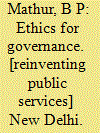

|
|
|
|
|
| Publication |
New Delhi, Routledge, 2014.
|
| Description |
xii, 396p.
|
| Standard Number |
Pbk
|
|
|
|
|
|
|
|
|
|
|
|
Copies: C:1/I:0,R:0,Q:0
Circulation
| Accession# | Call# | Current Location | Status | Policy | Location |
| 057861 | 351.54/MAT 057861 | Main | On Shelf | General | |
|
|
|
|
| 6 |
ID:
106498
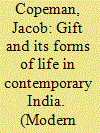

|
|
|
| 7 |
ID:
086527
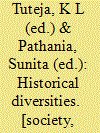

|
|
|
|
|
| Publication |
New Delhi, Manohar, 2008.
|
| Description |
468p.Hbk
|
| Contents |
Essays for Professor V N Datta
|
| Standard Number |
9788173047923
|
|
|
|
|
|
|
|
|
|
|
|
Copies: C:1/I:0,R:0,Q:0
Circulation
| Accession# | Call# | Current Location | Status | Policy | Location |
| 054128 | 954.025/TUT 054128 | Main | On Shelf | General | |
|
|
|
|
| 8 |
ID:
143990
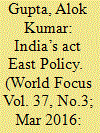

|
|
|
|
|
| Summary/Abstract |
Contemporary India aspires to play an ever bigger role in the world to reap the economic benefits from different parts of the globe. It aspires to play a role even beyond its international personality and capacity under the present political dispensation. However, for historical reasons it may have failed to build the capacity in manner and might that could have made it possible. The failure of course is more on account of either ignoring the changing nature of factors of economic growth; or failing to comprehend the factors that have been contributing to the economic growth of nation-states of the world in general and US, UK, and China in particular over more than last twenty years.
|
|
|
|
|
|
|
|
|
|
|
|
|
|
|
|
| 9 |
ID:
144554
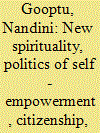

|
|
|
|
|
| Summary/Abstract |
India has seen a recent upsurge in spiritual practices promoted by an entrepreneurial breed of leaders and organizations. Their primary preoccupation is not to preach religious faith and belief or to promote ritual practice, but to provide guidance on psychological and physical well-being, happiness, and a healthy lifestyle. They offer strategies for healing and re-energizing, and advocate self-management and self-development as tools of both material advancement and mental contentment. Spiritual practices emphasize individual agency, personal empowerment, and reliance on one's own ‘inner’ resources, and valorize the autonomous, self-governed citizen as the protagonist of a modern and modernizing nation. While being reminiscent of the sacralization of everyday life and the rise of the ‘self-ethic’ in New Age spiritual movements in the West, Hindu versions of new spirituality in India draw upon religious traditions and construct a narrative of laicization of the esoteric and people-centric spirituality, consonant with the prevalent democratic zeitgeist. This article explores the implications of these developments for political subjectivity, religious identity, and notions of citizenship and democracy.
|
|
|
|
|
|
|
|
|
|
|
|
|
|
|
|
| 10 |
ID:
171981
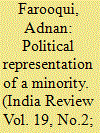

|
|
|
|
|
| Summary/Abstract |
Set against the political ascendance of the Hindu Nationalist BJP, this paper engages with the issue of political representation of Indian Muslims in the legislative arena. It gives an overview of broad trends and patterns in Muslim representation and seeks to draw out conclusions by focusing exclusively on the last two parliamentary elections. The paper argues while the Muslims have remained underrepresented in the legislative arena since Independence, the rise of BJP on a decidedly majoritarian political and social agenda makes it distinct from the earlier period. The attempt here is to flag out systemic shifts in Indian politics and what they mean for Indian Muslims. How different these shifts are for the Muslims compared to their past experience? And what are its possible implications?
|
|
|
|
|
|
|
|
|
|
|
|
|
|
|
|
| 11 |
ID:
117085
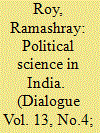

|
|
|
| 12 |
ID:
051061
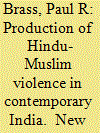

|
|
|
|
|
| Publication |
New Delhi, Oxford University Press, 2003.
|
| Description |
xv, 476p.: maps, figures, tableshbk
|
| Standard Number |
0195664884
|
|
|
|
|
|
|
|
|
|
|
|
Copies: C:1/I:0,R:0,Q:0
Circulation
| Accession# | Call# | Current Location | Status | Policy | Location |
| 047894 | 954.2/BRA 047894 | Main | On Shelf | General | |
|
|
|
|
|
|
|
|
|